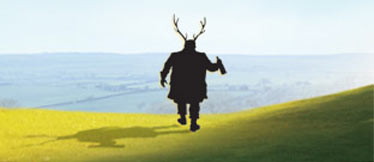
December 21, 2006, by Peter Kirwan
Merry Wives: The Musical (RSC) @ The Royal Shakespeare Theatre
Yes boys and girls, it’s that time of year- it’s the Big Christmas Musical!
While part of me was really looking forward to this evening- a Gregory Doran production, the star power of Simon Callow, Judi Dench and Alistair McGowan and the promise of a new take on what is probably my least favourite comedy- part of me had reservations. Would the RSC fall into the trap of relying on stars to carry a show? Would the song-and-dance simply be embarrassing? Would this actually work?
It’s certainly been pulled off in style. Pyrotechnics and descending scenery, a full orchestra, acrobatics and big dance numbers, some excellent voices, a troupe of insanely cute children and plenty of visual spectacle- it’s everything it says on the tin. Music ranged from country to Stomp, with most styles of musical getting a nod.
Of the big names, Simon Callow turned in a fine performance- pompous, jolly, impossible to discourage. His Falstaff was very likeable, and while the audience loved to see him fall, they remained on his side throughout. Judi Dench was also, as you’d expect, very good- her part heavily beefed up to bridge the gaps between Henry IV and Henry V, explaining how she falls out of love with Falstaff and in love with Pistol. Neither of them had great singing voices (Judi in particular seeming to struggle this evening with a croaky voice), but both commanded the stage- and our familiarity with them allowed for sneaky in-jokes, such as Judi’s final appearance in an Elizabeth I costume. Alistair McGowan was a revelation as Ford, though- with impeccable comic timing, a flexible and very funny physical movement and an evil moustache, his appearances were a real highlight.
The cast seemed to be enjoying themselves completely. Mistress Ford and Page, getting an enormous percentage of stage time, cackled and posed, embracing their musical personas with a lot of gusto, and the supporting cast (magically appearing, of course, for all the big numbers) always seemed to relish their songs, whether playing a variety of musical instruments, doing an impromptu tap dance or simply tangoing. A wonderful moment occurred as Ford rifled through the buckbasket and threw a sheet over his shoulder, which caught on the antlers of a deer’s head on the wall- the play pausing for a couple of moments as some of the characters tried to get it down while the others cracked up in character. The word ‘romp’ has been applied to this production by almost everyone, and it certainly applies.
To go through all the wonderful moments the production achieved would take forever, but some need to be mentioned. The double-act of Hugh Evans (Ian Hughes) and Dr. Caius (Paul Chahidi) was a highlight, the two indulging in a very funny song about the relative merits (or otherwise) of Wales and France, and drawing the biggest laughs throughout the production. The children performed well, including one priceless moment as Hugh led them skipping around as fairies, and the smallest child, wearing a huge pumpkin head, ran across the stage and crashed into a wall! Falstaff’s minions were also excellent, arriving on a huge motorbike and dressed as punks. In particular, Brendan O’Hea’s Pistol was a cross between Russel Brand and Jack Sparrow, swaggering and postulating all over the stage- as well as having one of the stronger singing voices. His performance was perhaps the best of the whole production, completely dominating the action when he was present- and his and Nym’s dance with Page and Ford as they told them of Falstaff’s tricks was hysterical. Finally, Anne and Fenton were the traditional good-looking hero and heroine, both with excellent singing voices, and they provided the key musical moments that reminded us we weren’t just here for the panto.
All this praise does sadly have to give way to criticisms. This was a very stylised musical, but often didn’t seem to fully commit itself. In Mistress Ford and Page we saw the actresses fully embrace the conventions, becoming almost one-dimensional at times in their commitment to character type. Yet, on the other hand, Doran introduced extra scenes for Mistress Quickly in an attempt to bring more pathos to the role, with a song mapping her move from Falstaff to Pistol that fitted oddly with the rest of the production- as did Ford’s bitter songs about seeing Falstaff burn in the fires of his hate. It’s a difficult thing to pin down, but the mood sometimes jarred, as if the play hadn’t completely decided whether it was serious theatre or the romp it had promised.
These are small complaints, though, when an audience loves a production. I don’t think it’s the best thing I’ve seen this year by a long way, but it was fresh and funny, which is something I for one appreciate next to all the other theatre I’ve been watching this year. It made no claims to be particularly sophisticated (I haven’t seen fart noises get that big a laugh at the RSC in a long time), but put an interesting spin on the play in order to make it serve a particular audience- the Christmas family crowd. I definitely enjoyed it, and will be humming the title tune for a little while still……
No comments yet, fill out a comment to be the first

Leave a Reply